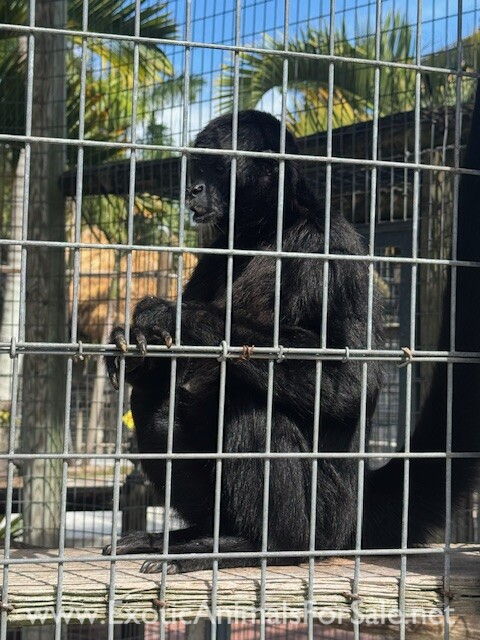Spider Monkeys For Sale



Pet Spider Monkeys
The spider monkey is a species of New World monkeys that is found naturally in the wild jungles of Southern Mexico all the way to Brazil. There are seven types of spider monkeys. These are White-bellied Spider Monkey (Ateles belzebuth), Peruvian Spider Monkey (Ateles chamek), Brown Spider Monkey (Ateles hybridus), White-cheeked Spider Monkey (Ateles marginatus), Black-headed Spider Monkey (Ateles fusciceps), Black Spider Monkey (Ateles paniscus) and Geffroy's Spider Monkey (Ateles geoffroyi).
Spider monkeys can live 40 to 50 years old. They reach sexual maturity at 7 years old. Groups up to 30 can be found living together in the wild.

Cappuchins / spider monkeys
- Name: JORGE PEREZ
- Posted: 12/20/2025
- Phone: 3057758056
- Email: Email Seller
- Location: Florida
we have a total of 1 capuchins and 6 spiders available , also 7 kinkajou troop, (1) Howler Monkey ,(4) spot nose all available contact me for prices all adults, 305-775-8056
Spider monkeys are kept as pets throughout the world. They are very popular as pets because of their looks. But they are a pet that is costly to care for. The large housing, toys, food, veterinary care and permit costs if required in your area.
Caging & Housing a Spider Monkey
Spider monkeys in the wild will stay up in the trees and will be more comfortable in an enclosure that allows them to be a distance off the ground at all times. As with all pets, the larger the space you can provide the better. Make sure the cage is very secure as they are smart and will try to escape. Solid platforms and swinging ropes are good to provide for simulating trees. You can use ropes, vines, bamboo, tire and branches for them. A shelter area needs to be available for the spider monkey to use to get out of the sun, rain or other weather when they want to. Toys are important to keep from your pet monkey from getting bored. You want to change out the toys at least weekly.
Monkeys cannot be potty trained. They can be very messy as that they will play and throw their feces. Young monkeys can learn to tolerate wearing a diaper. Some will not tolerate diapers as well when they get older.

What does a Spider Monkey Eat?
The main diet of a wild spider monkey is a wide variety of fruits along with some insects and small reptiles. In captivity, you should feed your pet spider monkey 80% fruits and 20% vegetables. Monkey chow or dog food needs to be offered twice a week to supplement the proteins they receive from insects and reptiles in the wild. The fruits that can be offered are avocados, bananas, mangos, oranges, tomatoes, watermelon, mangos and other fruits. Vegetables to be fed are lettuce, cucumbers, carrots and corn on the cob. Bread can be offered as a treat.
Veterinary Care
Your pet spider monkey needs to be examined by a veterinary that is knowledgeable in non-human primates. There are many diseases and illnesses that monkeys can spread to humans. You want to be aware of the zoonotic diseases so you can watch for them and take the proper precautions if your monkey becomes infected with them. Also they can be a carrier for herpes B that can be transmitter to you. You will want to have a blood test done to check for this. There are other vaccines that your monkey will need like rabies vaccine. But your vet will go over all that is needed.
Legal and Permits for monkeys
Non-human primates may be regulated in your area. There are states that it is illegal to have a pet monkey. You will first need to check with your local ordinance to see if the city or township allows them. If they do, check the county you live in for their ordinances. If all is good, contact your state's Department of Agriculture to obtain their regulations and requirements for a permit, if allowed in your state.







Comments